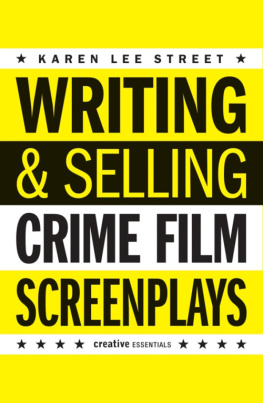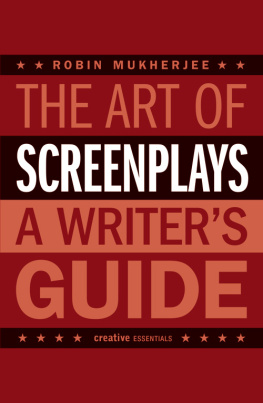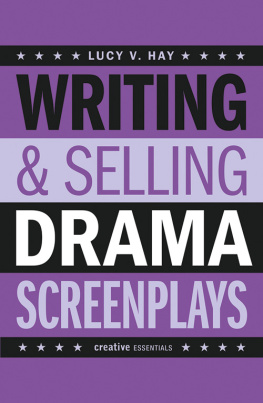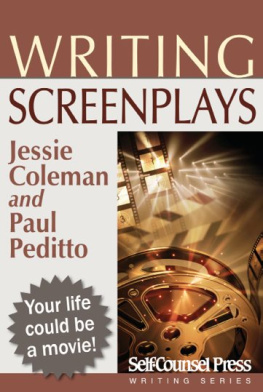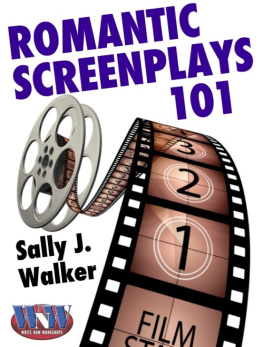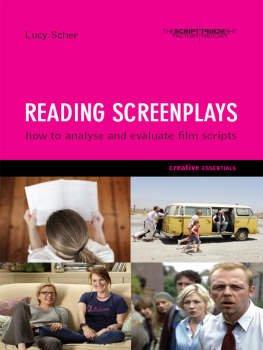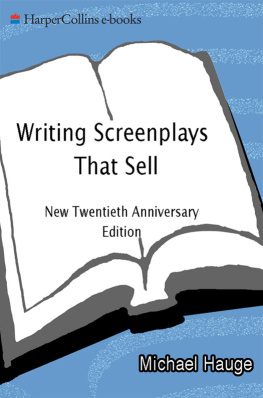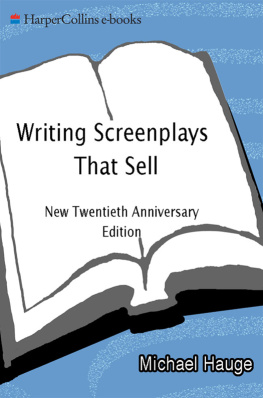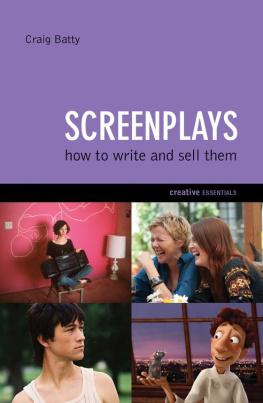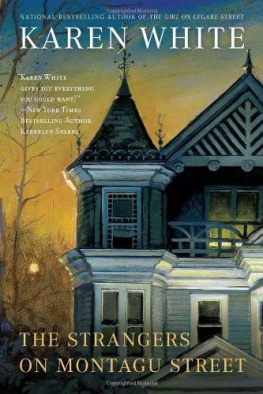Karen Lee Street - Writing & Selling Crime Film Screenplays
Here you can read online Karen Lee Street - Writing & Selling Crime Film Screenplays full text of the book (entire story) in english for free. Download pdf and epub, get meaning, cover and reviews about this ebook. year: 2013, publisher: Oldcastle Books, genre: Home and family. Description of the work, (preface) as well as reviews are available. Best literature library LitArk.com created for fans of good reading and offers a wide selection of genres:
Romance novel
Science fiction
Adventure
Detective
Science
History
Home and family
Prose
Art
Politics
Computer
Non-fiction
Religion
Business
Children
Humor
Choose a favorite category and find really read worthwhile books. Enjoy immersion in the world of imagination, feel the emotions of the characters or learn something new for yourself, make an fascinating discovery.
- Book:Writing & Selling Crime Film Screenplays
- Author:
- Publisher:Oldcastle Books
- Genre:
- Year:2013
- Rating:4 / 5
- Favourites:Add to favourites
- Your mark:
- 80
- 1
- 2
- 3
- 4
- 5
Writing & Selling Crime Film Screenplays: summary, description and annotation
We offer to read an annotation, description, summary or preface (depends on what the author of the book "Writing & Selling Crime Film Screenplays" wrote himself). If you haven't found the necessary information about the book — write in the comments, we will try to find it.
Writing & Selling Crime Film Screenplays — read online for free the complete book (whole text) full work
Below is the text of the book, divided by pages. System saving the place of the last page read, allows you to conveniently read the book "Writing & Selling Crime Film Screenplays" online for free, without having to search again every time where you left off. Put a bookmark, and you can go to the page where you finished reading at any time.
Font size:
Interval:
Bookmark:
Aimed at screenwriters, producers, development executives and educators interested in the crime genre, this book provides an invaluable basis for crafting a film story that considers both audience and market expectations without compromising originality. A brief historical overview of the crime genre is presented for context along with an analysis of various crime sub-genres and their key conventions, including: police, detective, film noir, gangster, heist, prison and serial killer. Karen Lee Street focuses on the creative use of these conventions and offers strategies for focusing theme and improving characterisation, story design, structure and dialogue. Paradigms, story patterns and writing exercises are provided to assist the script development process and strategies for revision are discussed along with key questions to consider before approaching creative or financial partners.

K AREN L EE S TREET has over twenty years international experience as a script development executive and workshop leader. She was instrumental in setting up the European Script Fund (now MEDIA Programme, development), the co-developer of numerous award-winning films from eighteen countries. As Head of Development, she evaluated hundreds of scripts each year and helped develop all ESF supported projects from concept to production. Karen currently lectures at City University.

Special thanks to Hannah Patterson, Anne Hudson, the Kamera Books team, Peter Carlton, Keith Potter, Vicki Madden, Jackie Malton, Sally Griffiths, Philip Palmer, Jon Gilbert, Sam Johnston, Mike Fear, Craig Batty and Darren Hill.
This is not a book on film genre theory. Its aim is not to debate the difference between a film style, mode, technique and genre or to attempt to establish rules that define crime sub-genres. It has a very simple goal: to present a user-friendly approach to writing and developing crime genre screenplays that address audience expectations without sacrificing originality.
My own fascination with the crime genre started fairly early as my grandfather was a pulp fiction writer whose stories were published in Dime Mystery Magazine, Black Mask and Street & Smiths Detective Story Magazine. He gave me impromptu lessons on how to write crime fiction as he sat behind his Smith Corona, haloed in smoke from his ever-present writing cigar. I have also written crime genre novels, but its primarily my two decades of script development experience as a development executive, freelance script editor, and script evaluator for major film funding bodies in Europe and North America that prompted my interest in finding a useful way to approach writing the crime in screenplay form. This work has entailed reading thousands of scripts, some very good, some very bad, most in need of further development.
THE FIRST PAN-EUROPEAN SCRIPT ANALYSIS SERVICE
Its one thing to critique a script and write a report about why that draft isnt working; quite different skills are required to actually figure out how to improve that script. The most practical experience I gained in script doctoring was during my time as Head of Development at the European Script Fund and European Media Development Agency, where my role was to facilitate the development of all funded projects from selection to production. ESF was the largest feature film development agency in Europe and is now the development funding arm of the MEDIA Programme, European Commission. We co-developed film and television projects from 18 countries by most of the key players in the European film industry, including Oscar-nominated and winning films such as Farinelli, Daens, Children of Nature, All Things Fair, Poussires de Vie, Journey of Hope, A Chef in Love and acclaimed features including Breaking the Waves, Orlando, Elizabeth, Rob Roy, Naked, Carlas Song, Toto le Hros, Hilary and Jackie, The Cement Garden and Live Flesh. I joined the company at its inception in January 1989 and set up the script submission evaluation system. It quickly became clear that common script weaknesses prevented projects from attracting initial development funding. It also became clear that many funded companies did not spend enough time on script development and either the project failed to secure production finance or went into production before the script was ready. I discovered that screenwriters are too frequently given script notes that are difficult to follow or that focus on minor problems rather than the bigger issues. This is exacerbated if the writer is receiving notes often contradictory from several people. To help counter this confusing process, I created the first pan-European script analysis service so that every funded writer and producer received detailed written feedback on their submitted script in a consistent, coherent format. These very detailed script analysis reports had a simple but effective structure designed to help the writer address the bigger issues first rather than getting muddled up in less important detail.
The script analysis service was hugely popular and helped to emphasise the importance of script development in the European film industry. And as we funded and analysed more scripts over a thousand projects during my tenure the most fundamental and fatal script problems became apparent:
An unclear concept (what is this story really about?)
A promising idea overcome by clich
A writer and producer with different visions for the project, resulting in a weakened story
Genre confusion
Looking more specifically at genre, script readers often labelled a projects genre as drama on the report form, even if the screenwriter claimed it was a thriller, love story or mystery. Why? Because the reader couldnt identify the genre. Conversely, the genre might have been clear to the reader, but the script was considered derivative and therefore boring. So how does a screenwriter write a crime genre film with a recognisable identity without descending into clich? That was the key question that prompted the research behind this book.
One of the first problems a writer faces when setting out to write a crime screenplay is defining the nature of the beast. If you list five crime films and then do a search to see how they are categorised on various websites, most are assigned to several genres. For example, Scarface is defined as: crime, gangster and film noir (Howard Hawkss version) or action-adventure (Brian de Palmas version).
Double Indemnity: crime, film noir, thriller
LA Confidential: crime, mystery, film noir, police drama
Oceans Eleven: crime, thriller, heist film
The Shawshank Redemption: crime, prison drama, buddy movie
If there is so much disagreement about how to categorise a produced feature film, how easy is it to define the genre, and indeed sub-genre, at script stage? And yet, this is what is often demanded by producers and funders who state they are looking for a gangster, heist or detective film, a prison or police drama, film noir, neo-noir, or a serial killer story. A starting point is to understand the conventions an audience (and therefore a producer) expects from a sub-genre. The next stage is to decide which conventions to adhere to and which might be subverted to bring something fresh to the genre. Very basically, if the crime genre is cake and its sub-genres are types of cake, how many ingredients can you alter before you end up with bread or pie or dumplings? The goal is to write a script that is recognisable as a crime genre piece, but with new elements that make it exciting to read.
Next pageFont size:
Interval:
Bookmark:
Similar books «Writing & Selling Crime Film Screenplays»
Look at similar books to Writing & Selling Crime Film Screenplays. We have selected literature similar in name and meaning in the hope of providing readers with more options to find new, interesting, not yet read works.
Discussion, reviews of the book Writing & Selling Crime Film Screenplays and just readers' own opinions. Leave your comments, write what you think about the work, its meaning or the main characters. Specify what exactly you liked and what you didn't like, and why you think so.

